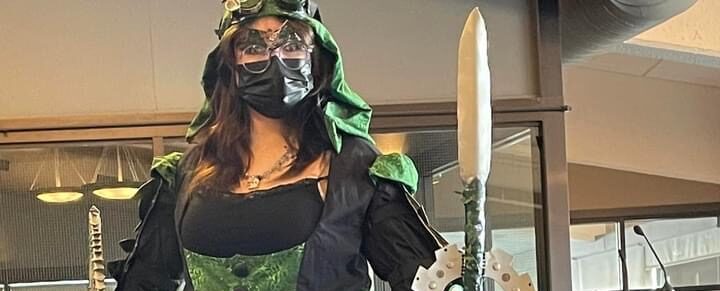Registration
Please read the rules below regarding the cosplay contest.
The Masquerade A.K.A. The Costume / Cosplay Contest
The Masquerade is a presentation costume contest. Contestants are judged on construction, artisanship and presentation.
It’s part costume contest and part fashion show / exhibit / presentation / skits / dance routines / and more! There is often an intermission featuring a performance (musical, or comedy, or …?). There are many reasons why our members spend all year planning and preparing for The Masquerade!
Audience members are welcome to wear costumes if they like; however, there is no requirement. Sit back and enjoy seeing the work and performances of our contestants.
Masquerade Rules
All decisions of the Masquerade Director are final.
Contestants may be judged in one or more of the following major categories:
- Presentation
- Artisanship
- Originality
- Skits(*)
Contestants who are not seeking judging or are not otherwise eligible for judging may exhibit the piece as an “Exhibition Only”. Exhibition Only contestants are ineligible for any awards or prizes associated with the Masquerade. Costumes that are Purchased or Commissioned may only participate as Exhibition Only Contestants.
(*)Skits will be judged on their own. You are not required to have a skit, but your performance will still affect your presentation score. Skits will be judged on originality, timing, and entertainment.
Presentation
Presentation will be broken down into two categories:
- Walk-on
- Skit
Walk-on
All participants in this category are required to walk on to center stage, show off all the different angles of the costume (front, side, back), to the judges and audience. We encourage everyone to stay in character and make the audiences and judges believe that you are that character.
Walk-on is about showing off your artisanship and for presentation of your costume.
We ask that people use their maximum stage time of 45 seconds on stage for the full effect of their costume. This is not mandatory, but HIGHLY recommended to maximise your exposure.
Skits
Skits are prepared ahead of time to tell a story and give a theatrical, musical or any type of visual performance to the audience such as dances. Some skits may have to be pre-approved to assure the safety of the contestants and other participants at the masquerade.
All skits must be no longer than 2 minutes in duration. If the skit exceeds the allotted time, they may have their score penalised and their performance cut off at the end of their time limit. No extra time will be given even if the size of the group is large.
We highly recommend that all skits submit their own audio. No microphones will be provided and we urge you to mix your own audio with dialogues pre-recorded.
Artisanship
Contestants being judged for artisanship will be judged on the construction of their piece AND their presentation of it. Contestants must compete in one of the following divisions in Master, Experienced, Novice, and Junior/Youth categories. They are described below.
Costumes eligible for artisanship judging must be at least 80% Constructed (i.e., from raw materials by any number of techniques). They may also be constructed by Modification (typically significant) of extant objects and garments. The Masquerade Director and Head Judge will be able to determine if there has been sufficient modification for a piece or prop to constitute that 80%. The remaining 20% allows for hard to construct components (e.g., footwear) to be included in the piece.
Costumes falling below that 80% threshold may be deemed Assembled and are still eligible for Presentation Judging. Depending on the time available, the judges may or may not be able to offer feedback on Constructed or Modified portions of the costume.
Costumes that are Purchased or Commissioned are only eligible for Exhibition Only
Master:
Any competitor may enter the Master division.
Experienced (a.k.a., Journeyman):
- Professional costumers may not enter in the Experienced division.
- A contestant who has competed and won in the Master division at a competition may not enter in the Experienced division.
- A contestant who has won more than three major awards in the Experienced (or Journeyman) division in competition may not enter the Experienced division.
- Awards won at regional competitions may be counted towards placement at the discretion of the Masquerade Director.
- Minor awards may be counted towards placement at the discretion of the Masquerade Director.
Novice:
- Professional costumers may not enter in the Novice division.
- A contestant who has competed and won in any division other than Novice at a competition may not enter in the Novice division.
- A contestant who has won “Best in Show” or “Best Novice” at a competition may not enter the Novice division.
- A contestant who has won numerous major awards in the Novice division at competitions is encouraged to enter the Experienced division
- Any additional awards won at regional competitions may be counted towards division placement at the discretion of the Masquerade Director.
- Minor awards may be counted towards placement at the discretion of the Masquerade Director.
Junior/Youth:
A child wearing a costume designed and built entirely by an adult should be entered either in the adult’s
appropriate skill division or entered as an exhibition (out of competition) piece.
Pre-Judging
Artisanship contestants must be prejudged on the day of the masquerade. You will be assigned an appointment to minimise congestion. If you have pre-registered, we will email you an appointment one-two weeks prior to the convention. The judging/greenroom location will be included in the appointment email and listed in the programming guide.
While it is not necessary to document your work, if you choose too, you can present such documentation during prejudging.
Similarly, if you are representing a specific theme and /or character, it would be advisable to bring references for the judges who may not be familiar with the theme and/or character.
Contestants must be on time for artisan judging appointments and report to the green room on time.
Appointments and report times will be provided to you at registration and failing to appear and ready to go on stage may result in disqualification.
Audio
All audio must be in MP3 format and MUST be submitted via the pre-registration system. We will select audio of our choice for on site registrations (i.e., the Friday or Saturday of the convention)
No microphones or any other playback means will be provided to any contestants.
General rules and regulations
All contestants must have valid Keycon membership in order to participate. Please present your badge at registration or judging for proper validation.
All participants must exhibit good behaviour and remain professional at all times. Rude behaviour and offensive remarks or insults toward staff, judges, or other contestants may be considered grounds for disqualification or further action from the convention.
All entries must adhere to the Keycon costume policy and weapons policy.
No nudity, obscene gore or sexuality will be allowed at this event. No costume is no costume. This is a family-friendly event and follows the movie rating of PG.
All contestants (artisans and models) 18 years of age and under on the day of the Masquerade must have their parent’s or legal guardian’s permission to enter (indicated by their signature on the registration form) and must be accompanied by their parent, legal guardian or adult designate at the show.
Attendants
Some costumes are exceptionally bulky, may be hard to put on, may restrict visibility or may restrict movement. In this case, some costumers choose to have with them an attendant (handler) to help them dress and navigate. Contestants may have with them a reasonable number of attendants with them when being judged or in the greenroom awaiting the masquerade.
Props
Certain props may be permitted for stage and judging process; however, must be pre-approved by the Masquerade Director in advance. An arrangement will be made to insure safety and full participation of the contestant.
No messy substance is allowed on stage (e.g., slime, glitter, confetti, bubbles, etc.). The stage must be as clean as it was before you walked on, when you walk off stage.
All stage props must be quick to set up and take down.
It is not required to have stage props.
Weapons Props
Blades: No metal blades (sharpened or blunted).
Firearms: No real firearms, “cold” weapons, no replica firearms
Bows (and other range weapons):
Functional bows must be unstrung when not presenting.
Non-functional bows may be strung with a light string or yarn that is not capable of firing a projectile.
No functional projectiles (e.g., anything with a rigid shaft). Cardboard or foam projectiles may be allowed at the discretion of the Masquerade Director.
Light and other Props
No pyro works, caps, open flame, fire, flash powder or flash paper is allowed. No laser pointers allowed. Sealed electronic flashes are permitted. Strobe effects may be allowed at the discretion of the Masquerade Director.
Masks
All contestants must comply with any federal, provincial, or municipal mask orders applicable to the Masquerade site. They must also comply with the hotel’s and Keycon’s general masking requirements.
Contestants will be permitted to remove their mask for the onstage presentation portion of the Masquerade, and are required to replace it once they leave the stage.
Other Rules
To insure safety, contestants must inform the Masquerade Director on the application form of anything they will be doing on stage. No secrets. This way the staff can take any precaution, or advise changes to assure all participants, staff and audience safety.
Surprise the audience and judges, not the Masquerade Director. If you are planning something (beyond walking and posing), you must discuss it with the Masquerade Director first.
The Masquerade Director reserves the right to remove anyone from competition based on taste, danger to the audience or other contestants, or for any other reason.
The Masquerade Director decisions are final.
Judging Criteria
But how does the judging work? Below is a breakdown of the scoring, within each division:
Artisanship
50/100 points
How good a job you did making the costume. Here we look at the stitching, the material, and the detail work. The sweat and blood poured in the creation of your amazing entry.
Originality
(and/or adherence to source material)
25/100 points
Whether your entry is from your own imagination or a faithful recreation of your favourite character, how well did you execute your vision?
Did you get creative in the use of materials? Did you do something unexpected?
Advocate to the judges why and how your creation fits in with this year’s theme.
Presentation
25/100
You made an awesome costume, time to show it off!
Don’t just flop on stage. Be in character, show off to the audience, wow the audience from the stage. If you or your group is performing a skit then that affects your presentation score.
Skits(*)
20/20
Skits will be judged on their own. You are not required to have a skit, but your performance will still affect your presentation score. Skits will be judged on originality, timing, and entertainment.
(*) Judged in parallel as a separate category from Artisanship and Presentation only categories.
Awards
Typically we have awards for each of the artisan divisions (Master, Experienced, Novice, and Junior/Youth), presentation and skit.
We will also typically have fan favourites awards. Voting procedures will be announced during the masquerade.
Awards will be announced on Sunday during closing ceremonies. Contestants are not required to be in costume or in attendance, but are of course welcome.
All judges’ decisions are final. They reserve the rights to withhold any awards if they deem no Contestants deserve them.

